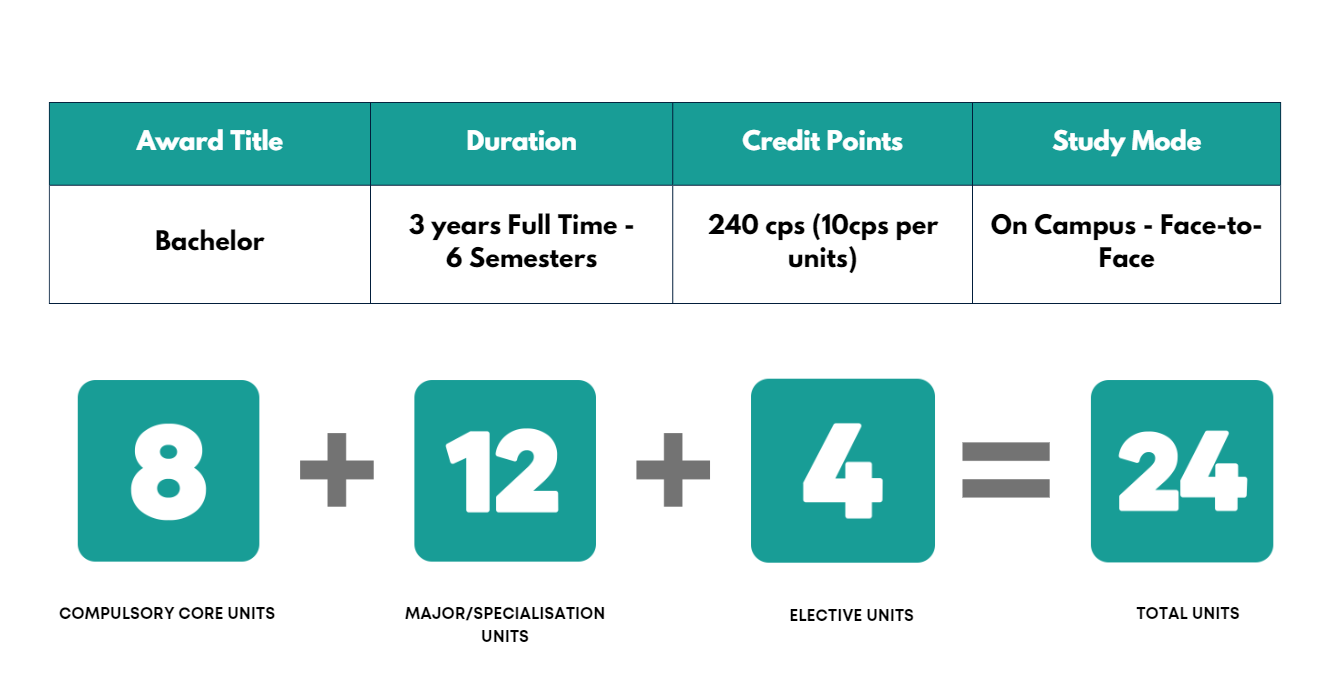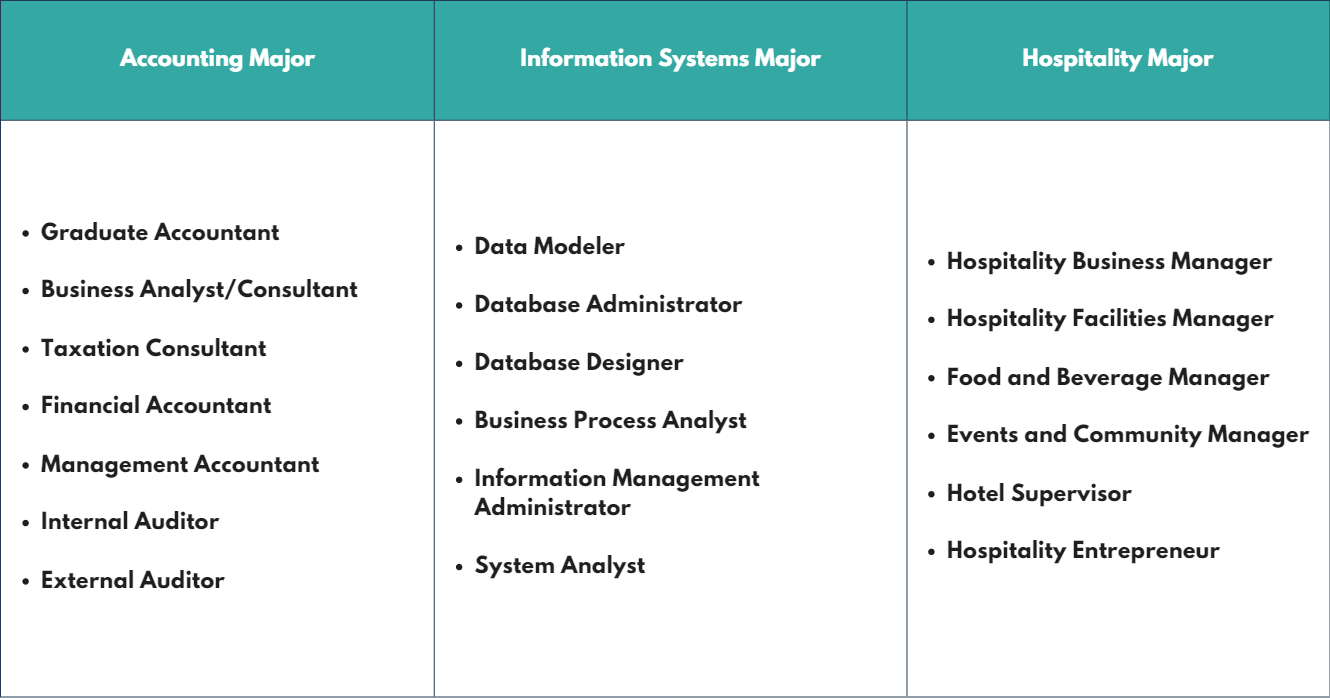BACHELOR OF BUSINESS ADMINISTRATION
Course Aim
The Bachelor of Business Administration course aims to provide a general business management education which brings together the disciplines of accounting, information systems and hospitality. This course combines theoretical and practical knowledge to build the students’ understanding of Business Operations. It also equips students with the analytical, technical and practical skills to apply effectively in the business world.
Course Rationale
As global businesses expand in size and nature, qualified professionals in business management are in high demand. To develop and manage businesses, companies actively seek the best graduates locally, nationally, and internationally. Therefore, many job openings are available in businesses today. The proposed Bachelor of Business Administration increases students’ employment prospects. The Bachelor of Business Administration course enables students to develop skills to think creatively and critically, communicate professionally, and make ethical business decisions to enable successful employment in a global organisation. The Bachelor of Business Administration course offers an innovative approach to understanding core business strategies and application in real-life settings. The goal of this course is to equip students with the knowledge and skills necessary to conduct research, engage in critical analysis, and develop strategic plans that benefit an organisation. Graduates who successfully complete the Bachelor of Business Administration course have an advantage when negotiating the corporate world. Lead Institute of Higher Education (LIHE) proposed Bachelor of Business Administration course comprises of 24 units delivered over six semesters with the option to choose a major in Accounting, Information Systems or Hospitality. This course focuses on preparing students for potential careers in the modern business environment, specifically preparing students
accounting, information systems or hospitality industries.
 Entry Requirement
Entry Requirement

Course Learning Outcomes
The Bachelor of Business Administration graduate will be able to:
1. Develop a broad body of knowledge in business management concepts, current practices in a global business environment and emerging technologies to support, sustain and innovate business;
2. Apply theoretical knowledge and technical skills to provide socially and ethically responsible evidence-based business solutions;
3. Construct new ideas and opportunities by using creative and innovative strategies in a business context;
4. Work successfully in both independent and in team settings to evaluate, analyse and apply business theory and practice for real world business scenarios;
5. Communicate effectively and professionally to diverse stakeholder groups using a range of communication and presentation modes and methods appropriate to various business contexts;
6. Utilise a range of digital technologies to support decision making and create solutions for business issues.
Graduate Attributes
The graduates of the Bachelor of Business Administration course will be able to:
1. Develop creative and effective responses to intellectual, professional and social challenges;
2. Synthesise theoretical knowledge and reflect critically on theory and its application;
3. Commit to sustainability and high ethical standards in social and professional practice;
4. Continue life-long learning and professional development, with self-direction and effective time management skills;
5. Communicate and collaborate with individuals, and teams in professional and community settings.
Graduate Career Outcomes
LIHE proposed Bachelor of Business Administration course is designed to give students a firm foundation of the skills required to launch and maintain a successful business in the current and future marketplace.
LIHE’s qualifications are aimed at providing a broad-based foundation for graduate positions that can lead to a wide range of rewarding careers. The LIHE Bachelor of Business Administration graduates will be suitable for following entry-level and similar roles:

LIHE proposed Bachelor of Business Administration course is designed to prepare students for potential careers in the accounting, information systems or hospitality industries. This is achieved through:
1. embedded work integrated learning experiences; and
2. industry engaged scholarly lecturers/tutors.
LIHE Bachelor of Business Administration course offers a Capstone Project in all 3 majors. The Capstone Project can be a unique opportunity for students to carry out independent group research in order to devise an innovative solution for a real-world problem as defined by industry partners. While a project of this scope and scale can be challenging, it can also be very rewarding. The Capstone Project is usually the final assessment and plays a vital role in preparing students for the workplace through its practical applications and ability to help hone students’ professional knowledge and skills. It will provide an opportunity for students to bring together their knowledge and experiences and prepare them for the next stages of their careers, whether in further study or the workplace. Students can hone the graduate capabilities they will need and gather evidence of their learning to give them confidence for the transition.
LIHE Bachelor of Business Administration course will be designed to ensure that assessments have a strong alignment between learning outcomes, teaching methods and learning activities. The assessment methods in the course will be designed to ensure that they are dependent on the learning outcomes of the unit.
The course will ensure good assessment practices and consider the balance between formative and summative assessment tasks, ensuring that the assessment tasks don’t over-assess. The assessments will be designed to ensure timely and meaningful feedback to students. Assessment processes will be reliable and valid, and marking will be moderated. The use of rubrics and marking guides will assist this process.
The following principles will guide the approach to good assessment practice:
• Focus on students as learners;
• Actively engage students in the learning and assessment tasks - this includes understanding about the assessment tasks, purposes and processes;
• Ensure assessment tasks are developmental throughout the course, moving from simple and short to complex and longer over time. Build capacity through assessment;
• Include an early assessment task in each unit so that students can gauge their progress;
• Take into account student diversity when designing assessment tasks and practices, so that individual students are not disadvantaged;
• Design authentic and realistic assessment tasks that prepare students for future employment and learning; and
• Ensure that assessment tasks are clearly communicated to students so that they have a good understanding of what is expected.
Furthermore, the learning activities in this course consist of case study-based assessments, problembased learning, problem-solving approaches and other strategies that clearly aim to build students’ skills in analysis, synthesis, evaluation, and hypothesis testing. To maintain compliance with relevant regulatory standards, LIHE will ensure clear alignment of teaching & learning and assessment activities with learning outcomes and graduate capabilities at course and unit levels.



